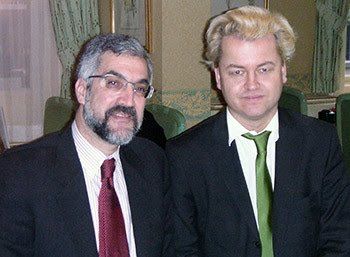 Anti-Islam groups in America have provided financial support to Dutch politician Geert Wilders, an anti-immigration campaigner who is seeking re-election to the Dutch parliament this week.
Anti-Islam groups in America have provided financial support to Dutch politician Geert Wilders, an anti-immigration campaigner who is seeking re-election to the Dutch parliament this week.
While this is not illegal in the Netherlands, it sheds light on the international connections of Wilders, whose Freedom Party is the least transparent Dutch parliamentary group and a rallying point for Europe’s far right.
Wilders’ party is self-funded, unlike other Dutch parties that are subsidized by the government. It does not, therefore, have to meet the same disclosure requirements.
Groups in America seeking to counter Islamic influence in the West say they funded police protection and paid legal costs for Wilders whose party is polling in fourth place before the Sept 12 election.
The Middle East Forum, a pro-Israeli think tank based in Philadelphia, funded Wilders’ legal defense in 2010 and 2011 against Dutch charges of inciting racial hatred, its director Daniel Pipes said. The Middle East Forum has a stated goal, according to its website, of protecting the “freedom of public speech of anti-Islamist authors, promoting American interests in the Middle East and protecting the constitutional order from Middle Eastern threats”. It sent money directly to Wilders’ lawyer via its Legal Project, Pipes said.
Represented by Dutch criminal lawyer Bram Moscowitz, Wilders successfully defended himself against the charges, which were brought by prosecutors in Amsterdam on behalf of groups representing minorities from Turkey, Morocco and other countries with Muslim populations. The case heard in October 2010 was filed in response to Wilders’ comments in the Dutch media about Muslims and his film “Fitna”, which interlays images of terrorist attacks with quotations from the Koran and prompted protests by Muslims in Islamic countries worldwide. The court found he had stayed within the limits of free speech.
Pipes declined to say how much his group paid for Wilders’ defense. Moscowitz declined to discuss payments for Wilder’s defense citing client confidentiality.
Wilders said in an emailed statement that his legal expenses were paid for with the help of voluntary donations from defenders of freedom of speech. “I do not answer questions of who they are and what they have paid. This could jeopardize their safety,” Wilders said.
David Horowitz, who runs a network of Los Angeles-based conservative groups and a website called FrontPage magazine, said he paid Wilders fees for making two speeches, security costs during student protests and overnight accommodation for his Dutch bodyguards during a 2009 U.S. trip.
Horowitz said he paid Wilders for one speech in Los Angeles and one at Temple University in Philadelphia. He declined to specify the amounts, but said that Wilders had received “a good fee.” When Wilders’ Philadelphia appearance sparked student protests, Horowitz said, he paid a special security fee of about $1,500 to the Philadelphia police department. Horowitz said he also paid for overnight accommodation for four or five Dutch government bodyguards accompanying Wilders on the trip.
Wilders said in response: “I am frequently asked to speak abroad. Whenever possible I accept these invitations. I never ask for a fee. However, sometimes the travel and accommodation expenses are paid. My personal security is always paid for by the Dutch government.”
Pipes and Horowitz denied funding Wilders’ political activities in Holland. Both run non-profit, tax exempt research and policy organizations which, under U.S. tax laws, are forbidden from giving direct financial backing to any political candidate or party. U.S. law does allow such groups to support policy debates financially.
During Wilders’ visit to Los Angeles, where Horowitz runs an organization called the David Horowitz Freedom Center, Horowitz said he organized an event at which Danish cartoons lampooning the Prophet Mohammed were auctioned. He said he did not remember how much money this event raised or what happened to the proceeds.
Horowitz agreed with the Dutchman’s repeated, public comparison of the Koran to Hitler’s Mein Kampf. Comparing the two works was a “fair analogy,” Horowitz said. He said Wilders was “fighting the good fight.”
Horowitz said U.S. backers helped Wilders raise money to pay legal fees to fight a ban from visiting Britain in 2009, where he planned to screen Fitna. The British government said at the time: “The Government opposes extremism in all its forms. The decision to refuse Wilders admission was taken on the basis that his presence could have inflamed tensions between our communities and have led to inter-faith violence.”
Wilders won an appeal in the British courts in October 2009 when the ban was overturned.
